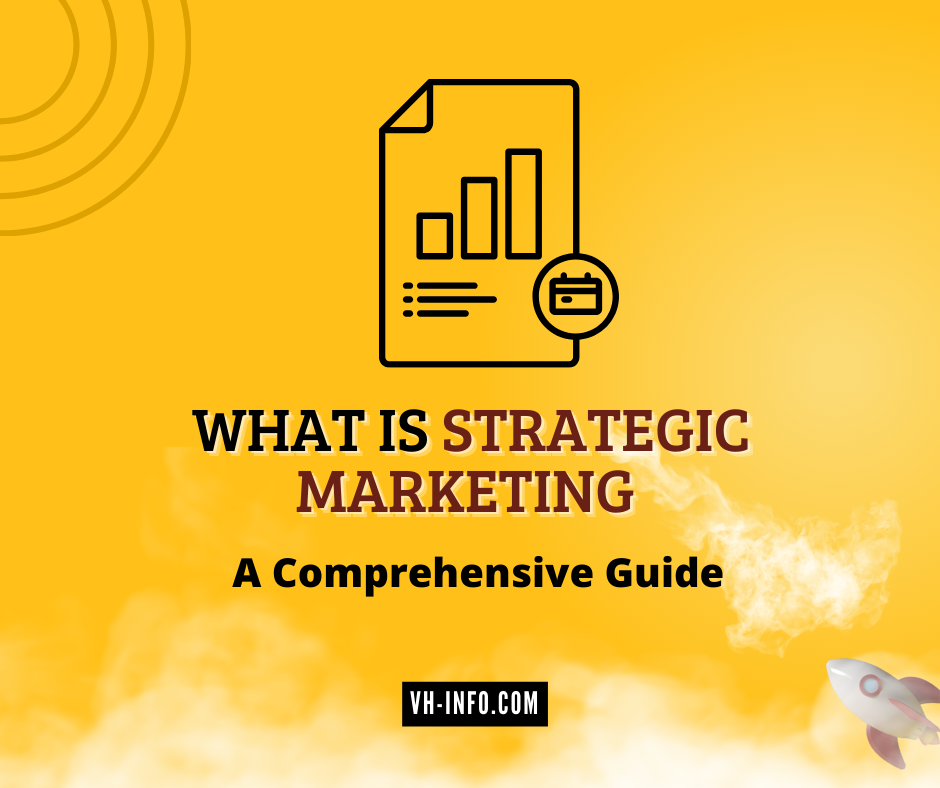Strategic marketing is a vital component of any business plan, as it sets the foundation for all other marketing activities.
In this comprehensive guide by VH-Info, we will explore what strategic marketing is and its importance in building a successful business. We will also delve into the five steps of the strategic marketing process and the phases that make up this process.
Additionally, we will examine factors that can make or break your strategic marketing efforts and provide definitions of strategic marketing from renowned authors.
To illustrate how strategic marketing works in practice, we have included some examples of companies that have successfully implemented it. Finally, we will answer some frequently asked questions about strategic marketing to help you gain a better understanding of this critical business function.
Read More: Digital Marketing Checklist 2024
What is Strategic Marketing?
Strategic marketing is the process of creating long-term plans to help a business grow and expand its customer base through strategic thinking. It involves figuring out who your target customers are, understanding their needs, and developing products, pricing, promotion, and distribution strategies that will meet those needs.
The goal of strategic marketing is to give your company an advantage over competitors by tailoring your business offerings to your chosen target market segments.
Strategic marketing helps guide a company’s decisions on where to focus its efforts and resources to maximize sales, profitability, and market share over time. The strategies are flexible to adapt as customer preferences and the competitive landscape evolve.
What is Strategic Marketing Planning?
Strategic marketing planning is the process of defining a company’s marketing goals and strategies. It involves analyzing the current market situation, understanding customer needs, setting objectives, and developing a strategic plan to meet those goals and achieve greater visibility for the company.
The plan includes decisions on product, price, promotion, and distribution strategies, all of which are aligned with the company’s goals. The goal is to develop a coordinated marketing program that will help the company achieve its goals and fulfill its vision for the future. In this stage, partner with a strategy consulting company to refine your marketing plan and achieve your company’s goals effectively.
What is the Strategic Marketing Process?
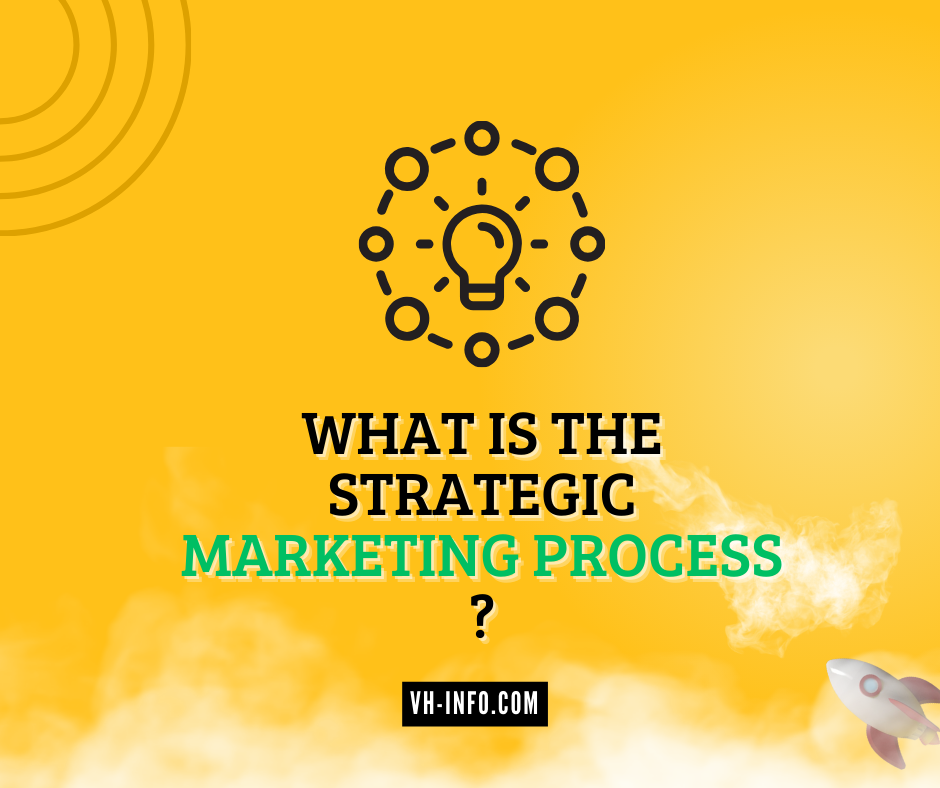
The strategic marketing process typically involves four key steps:
- Analyzing the current situation by looking at the company’s internal strengths/weaknesses and external opportunities/threats.
- Setting marketing objectives and goals based on this analysis.
- Develop specific strategies and plans to meet these goals – such as product development, pricing, promotion, and distribution.
- Implementing the strategies across the marketing mix, while continually monitoring progress and adjusting as needed to stay on track.
What is Strategic Marketing Management?
Strategic marketing management is the practice of using marketing analysis, planning, and control techniques to achieve business goals. It starts with a thorough analysis of the company’s internal strengths and weaknesses, customer needs, competitor actions, and the broader market environment.
Based on this analysis, specific marketing objectives are established that align with the company’s overall mission. Detailed marketing strategies are then developed and implemented across product development, pricing, promotion, distribution, and more.
Through ongoing monitoring and adjustment, the company makes sure all marketing activities collectively build customer relationships, competitive advantage, and sales growth in line with strategic business objectives, including the use of a SWOT analysis. The goal is to manage marketing as an integrated strategic function rather than a set of isolated tactics.
Importance Of Strategic Marketing
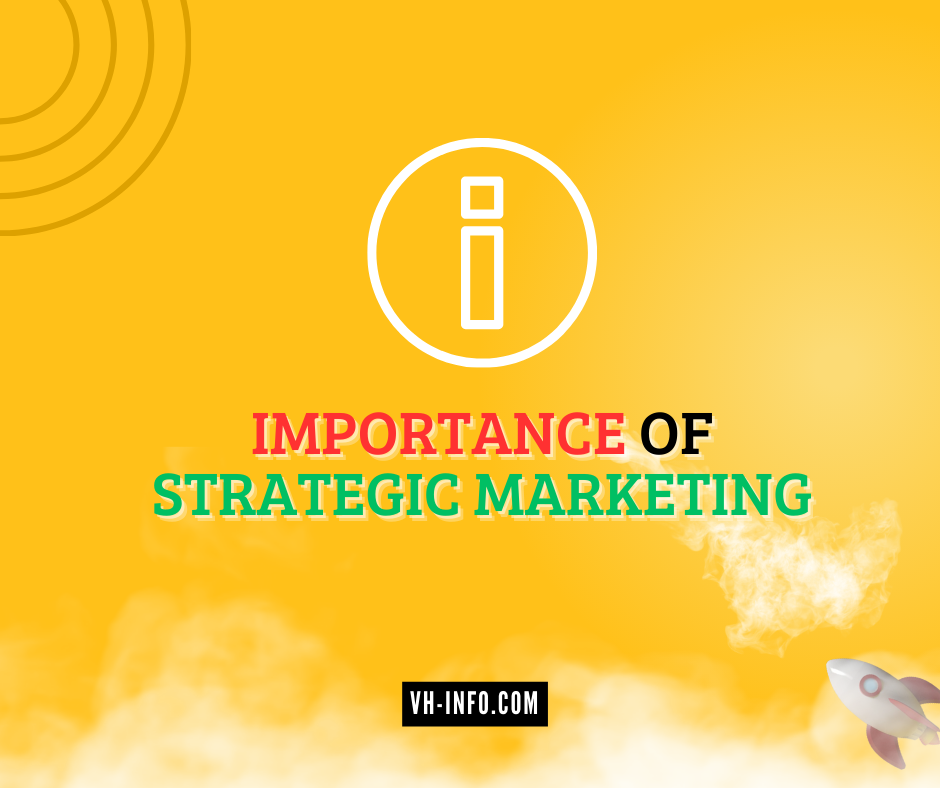
Here are a few key reasons why strategic marketing is important for businesses:
- Helps align business activities to meet core objectives and goals: Having a defined strategy provides direction and focus for marketing efforts and resource allocation.
- Aids in understanding customers and targeting segments effectively: Strategic marketing involves researching target demographics and buyer personas to tailor offerings to their needs and preferences.
- Provides competitive advantage: Performing strategic analysis of the competitive landscape using some of the best startup tools, allows businesses to identify areas of weakness, strength, and opportunities to differentiate.
- Enables proactive responses to market changes: Ongoing analysis of emerging trends, disruptions, and growth opportunities allows strategic marketing to adapt plans over time.
- Optimizes resource utilization: A documented strategy allows for focused, coordinated efforts across departments to work towards common goals.
- Builds brand awareness and loyalty: Strategic product branding and messaging create emotional connections with customers and establish credibility.
- Drives growth and profits: Aligning tactics to strategic goals fosters innovation and helps capture additional market share to boost revenues.
- Reduces risk: Methodical research, planning, and analysis help anticipate risks and challenges and mitigate them proactively.
Read More About : Best 11 Digital Marketing Books 2024
What Are the Five Steps of the Strategic Marketing Process?
- Create mission, goals, and objectives – Craft a mission statement defining the overall purpose and vision. Set specific measurable marketing goals and objectives aligned with the mission.
- Situation analysis – Thoroughly research the market and competitive landscape using SWOT, PESTLE, Porter’s 5 Forces, and other models to analyze internal strengths/weaknesses, and external opportunities/threats.
- Marketing strategies – Based on situation analysis, develop integrated strategies for product, pricing, distribution models, and promotional mix to achieve goals and objectives.
- Implementation – Create comprehensive marketing plans detailing precise actions, budgets, timelines, metrics, and responsibilities needed to execute strategies.
- Control – Put in place systems to monitor implementation using key performance indicators. Identify issues and make adjustments to get back on track.
Following this structured strategic marketing process ensures alignment of marketing with overarching business goals.
Strategic Marketing Process Phases
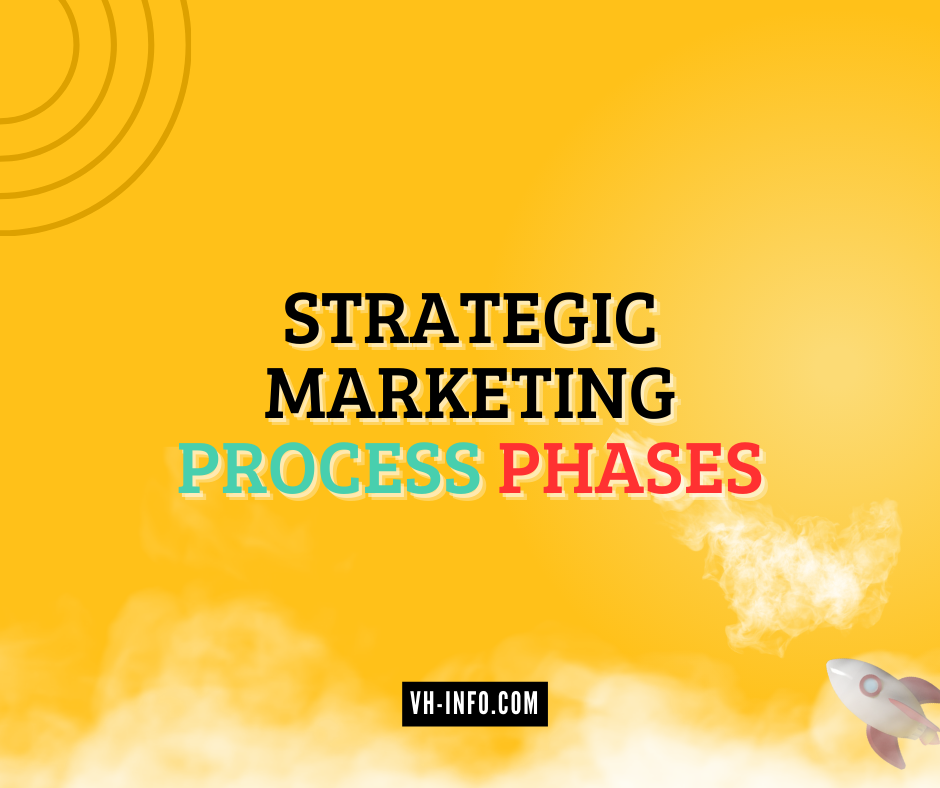
The strategic marketing process involves four distinct phases:
- Planning Phase: This is the first and most important step in strategic marketing. In this phase, you figure out why you’re doing marketing, what your business needs, and what goals you want to achieve. Having a clear plan is like having a map before you go on a trip – it guides your marketing efforts and makes them more effective.
- Analysis Phase: During this stage, you look at the outside world, like your competitors and the market you’re in. You do research to understand what’s going on, like what’s popular, who your competition is, and what your target customers want. This information helps you see if your goals are realistic and if there’s demand for what you’re offering.
- Development Phase: Once you know your industry and where you stand, you start creating your marketing plan. This phase is more about the practical stuff, like deciding what product or service you’ll offer, setting a price, choosing where to sell it (online or in-store), and planning how to promote it. It’s like putting all the pieces together to make your marketing strategy work.
- Implementation Phase: This is when you put your plan into action. You start doing the marketing activities you’ve planned, like launching your product and trying to make sales. After you’ve started, it’s crucial to keep an eye on how things are going and be ready to adjust if needed because the market is always changing.
Factors That Can Make and Break Strategic Marketing?
You can figure out things like finding new ways for your business to grow, understanding who your real customers are (even if they’re different from what you originally thought), learning how to get more customers, and deciding where to invest your money for future marketing with a good marketing plan.
Your Knowledge of Your Intended Market
Understanding your intended market and their pain points and expectations is crucial for effective marketing strategy. It’s like knowing who your potential clients are and what they like. This helps you create the right messages and products they’ll love.
Without this info, your marketing might not work well. So, learn about your ideal customer and use that knowledge to make your content marketing strategy better.
Communicating The Value To Your Customers
Telling your customers why your product is great is a big deal. Even if you have fantastic marketing, it won’t work if people don’t understand why they need your product. So, make sure you explain the benefits clearly, and your message should match what makes people want to buy. It’s like saying, “Here’s why you should get this, and it’s what you want.”
Data Monitoring
Keeping an eye on your data is crucial, especially with free tools like Google Analytics. It helps companies see which web pages are popular, how long people stay on their site, where visitors come from, and more. If you don’t pay attention to this data, you might lose track of your whole marketing plan. So, regularly checking your data and understanding things like website traffic, sales, and customer info is like using a compass to navigate – it keeps you on the right path and helps your strategy get better. Additionally, using the best web scraping API can provide further insights from external sources, enhancing your understanding of market trends and customer behavior. You can even refer to an XPath cheat sheet to streamline your data extraction process and improve accuracy.
Focus
Successful businesses make their customers happy before making a lot of money. It might sound strange, but it actually works. When you focus on giving people what they need and want, your business can grow in amazing ways.
Including your marketing team in research and development meetings and finding new ways to help people can make this happen.
By staying committed to making customers happy, you build trust and loyalty, which is much better in the long run than just trying to make quick profits. So, focusing on customers and providing ongoing value is the key to lasting success.
Strategic Marketing Definition by Authors
Strategic marketing is defined differently by various authors.
Marketing Strategy Definition From Philip Kotler
Philip Kotler states, “A market consists of all the possible consumers sharing a certain need or want who would be ready and able to participate in trade to fulfill that need or desire.”
Marketing Strategy Definition From Omer Farkash
Omer Farkash defines a marketing strategy as a long-term plan for any organization or business. The main aim of this plan is to gain a lasting competitive edge by understanding what customers need and want, ultimately achieving a sustainable competitive advantage.
In simpler terms, it’s a smart, forward-thinking plan to make a business stand out by giving customers what they desire.
Marketing Strategy Definition From Adam Barone
“A marketing strategy refers to a business’s overall game plan for reaching prospective consumers and turning them into customers of their products or services. A marketing strategy contains the company’s value proposition, key brand messaging, data on target customer demographics, and other high-level elements.”
Adam Barone defines a marketing strategy as the big plan a business uses to find potential customers and convince them to buy their products or services.
This plan includes things like what makes the company special, the important messages they want to send about their brand, information about the kinds of customers they’re aiming for, and other important details at a high level.
In simpler words, it’s the strategy a company uses to attract and convert customers through inbound marketing, including what they say about their brand and who they’re trying to reach through marketing techniques, customer engagement, and search engine optimization.
Marketing Strategy Definition From Noah Kagan
Noah Kagan’s marketing strategy definition focuses on the fundamental importance of having a product or legal services that meets people’s wants and needs. In his view, without a desirable product or service, all other aspects of marketing become irrelevant.
In simpler terms, a successful marketing strategy begins with offering something people genuinely want, and without that, nothing else in your marketing efforts really counts.
What Are Strategic Marketing Examples?
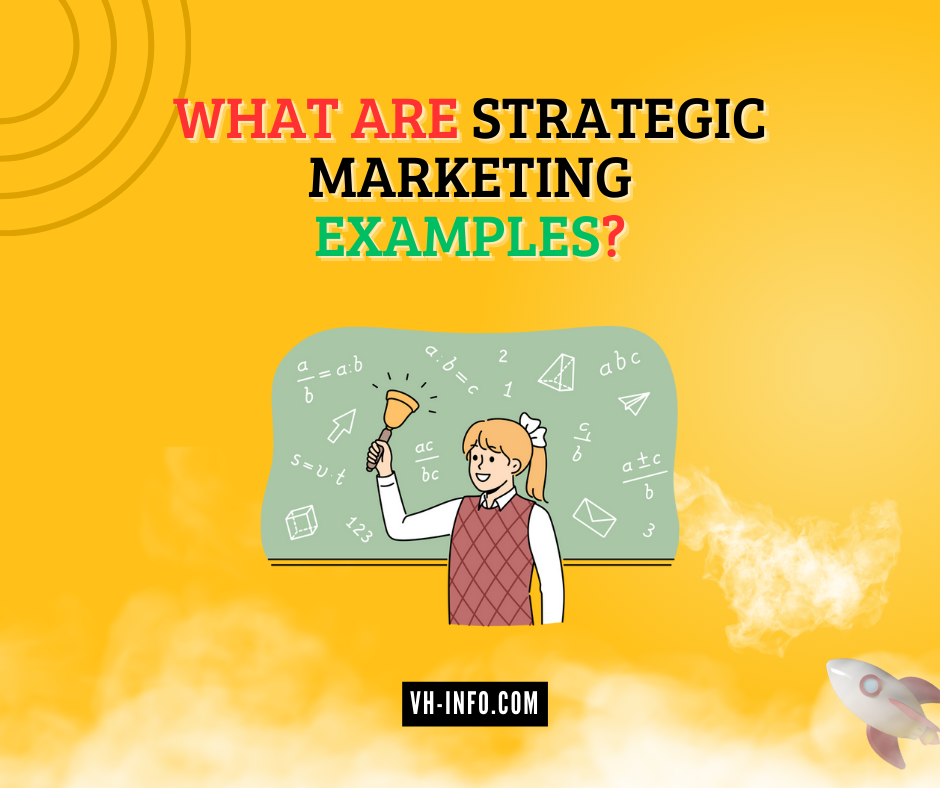
Here are some examples of effective strategic marketing by major brands:
- Spotify pioneered music streaming by offering an intuitive user experience. Instead of downloading, Spotify allowed instant access to millions of songs. Personalized playlists and sharing features catered to user listening preferences. This innovative model disrupted the music industry.
- Coca-Cola has long associated itself with inclusive causes like diversity, environmentalism, and community service. Its “Open Happiness” campaign connected its products to values like optimism and unity. This emotional branding resonates across generations.
- Apple established itself as a premium brand via sleek, user-friendly product design. IT made complex tech easily accessible. Apple cultivated brand loyalty by positioning its devices as status symbols for innovators. Its minimalist stores further its branding.
- Tesla captured the luxury electric vehicle market by targeting tech-savvy, eco-conscious early adopters. Its focus on automation, connectivity, and superior performance appealed to these buyers. Tesla’s branding emphasizes sustainability and innovation.
- Nike built its brand identity around champion athletes and inspirational messaging like “Just Do It.” Sponsoring sports stars and targeted marketing portray Nike as a performance-driven brand for competitive athletes at all levels.
Marketing Strategy Vs Strategic Marketing Vs Marketing Plans
Here is a table comparing marketing strategy, strategic marketing, and marketing plans:
Term | Definition | Purpose | Scope |
| Marketing Strategy | An integrated set of choices that determine how a brand will engage with customers | Outlines high-level approach to achieve marketing objectives | Broader vision and direction |
Strategic Marketing | Process of analyzing markets and designing strategies to attain competitive advantage | Systematic framework to guide marketing decisions | Ongoing cycles of analysis, planning, and optimization |
Marketing Plans | Detailed action plans to execute strategies through marketing mix tactics | Brings marketing strategies to life through concrete activities | Specific programs, budgets, metrics, timelines |
FAQ’s:
What is the strategic role of marketing?
The strategic role of marketing is to use research-based insights to identify target customers and develop integrated strategies that deliver value. This provides a competitive advantage and helps achieve organizational goals. Marketing acts as a strategic bridge between the company and its external environment, including public relations and direct marketing.
It translates business strategy into tactics that influence consumer behavior and build customer relationships. When treated as a strategic function, marketing guides activities ranging from product development to communications and customer service across departments.
Why is having a marketing strategy important?
A strong marketing strategy is essential for many reasons.
Firstly, it helps to concentrate marketing efforts in the best areas of digital marketing. This means that focus and direction are provided, rather than scattering resources.
Secondly, it ensures that marketing aligns with the business goals and creates unified messaging.
Thirdly, a strategy guides resource allocation and coordinated tactics across departments.
Fourthly, progress can be measured with a defined strategy. This enables agility to continuously optimize efforts.
Finally, a marketing strategy is crucial for prioritizing investments that enhance competitiveness and drive growth. It keeps marketing targeted, integrated, adaptable, and accountable.
Is strategic marketing management right for your team?
Strategic marketing management means aligning marketing with business goals and strategy. It works when teams take an integrated, research-driven approach instead of working separately.
This approach focuses on planning, execution, and agile optimization that work for dynamic environments. The organization needs staff and systems to track progress versus objectives.
The top benefit is coordinated programs that achieve growth and competitive advantage. If there’s a lack of vision or harmony, strategic management brings the necessary structure and cohesion to the department. Moreover, companies can leverage tools for IT professionals to improve business operations and achieve better results.
What role does research play in developing a strategic marketing plan?
Strategic marketing involves market research for a good plan. This research gives insight into customers and markets to identify segments and growth. Strategies align with needs, preferences, positioning, and messaging. Regular research helps adjust as markets change. Research reduces risk and boosts productivity by allocating resources well.
It minimizes guesswork during planning and ensures goals are more likely achieved by anchoring in market research and understanding market position. This makes marketing efforts focused and effective in achieving organizational goals and maintaining a strong market position. Be it in a traditional sector like the potato market, or a digital field such as SaaS services, conducting thorough market research is essential.
Conclusion
Strategic marketing is a comprehensive and dynamic process that involves careful planning, analysis, development, implementation, and control. It plays a crucial role in the success of any business by aligning marketing efforts with overall business goals and objectives.
Throughout this blog, we have explored various aspects of strategic marketing, including its definition, importance, process phases, factors that can make or break it, and examples from successful companies.
Whether you are a marketing professional or a business owner, it is essential to invest time and resources into developing a well-defined strategic marketing plan to achieve long-term success and growth.
Remember, strategic marketing is not just about creating marketing plans; it is about integrating marketing into your overall business strategy to drive sustainable results.

